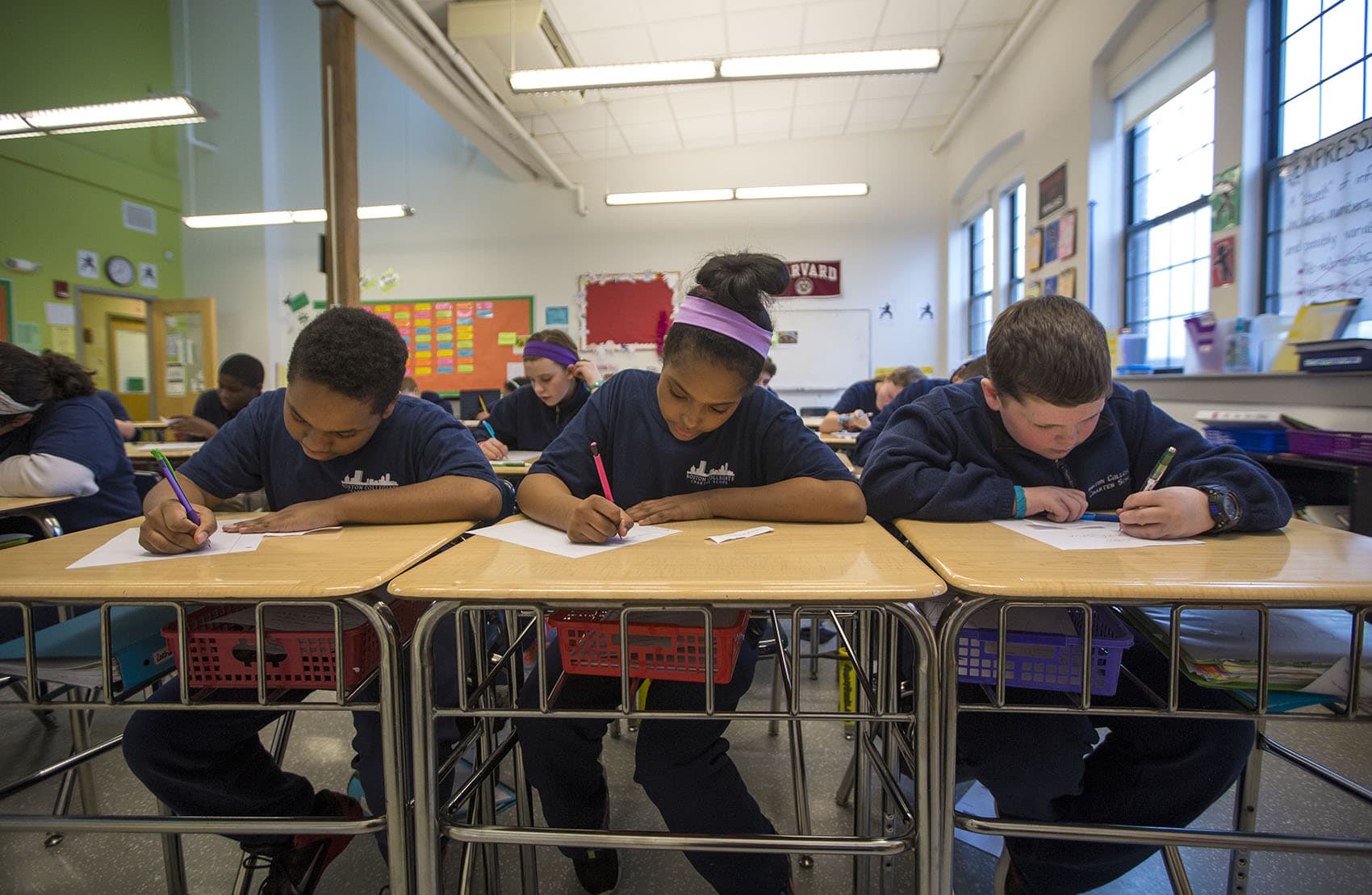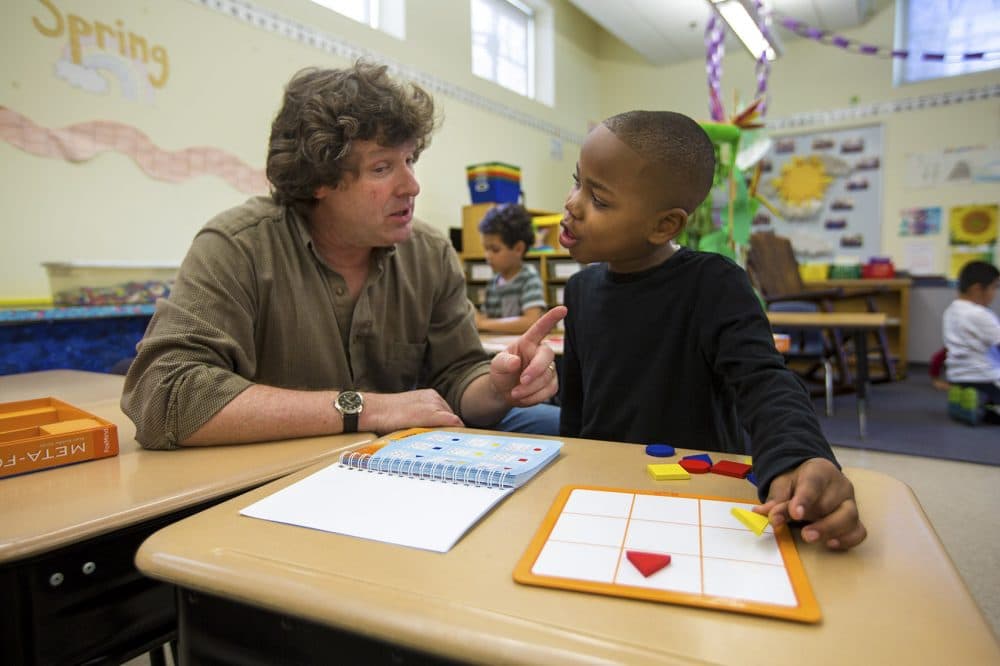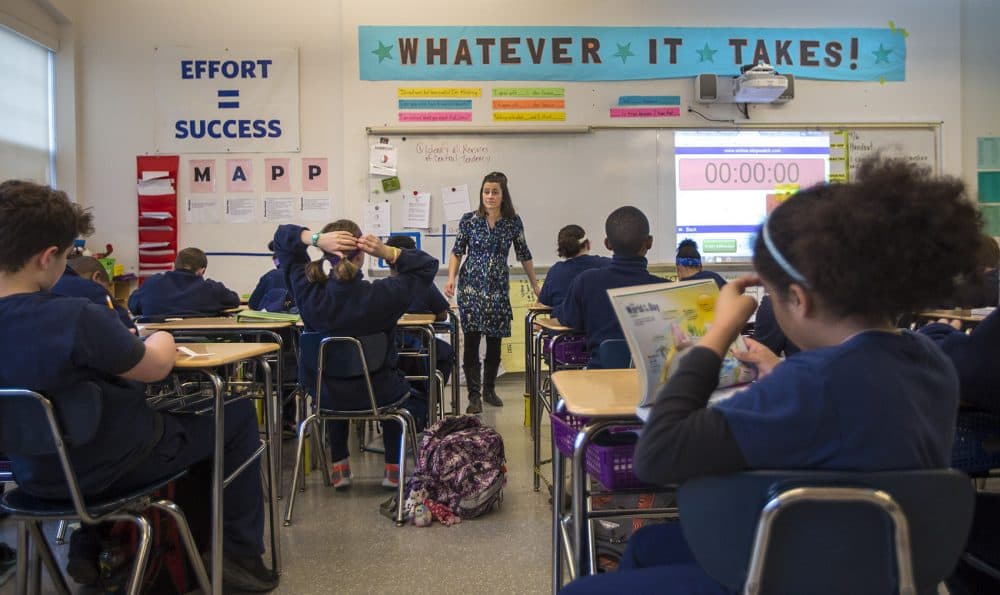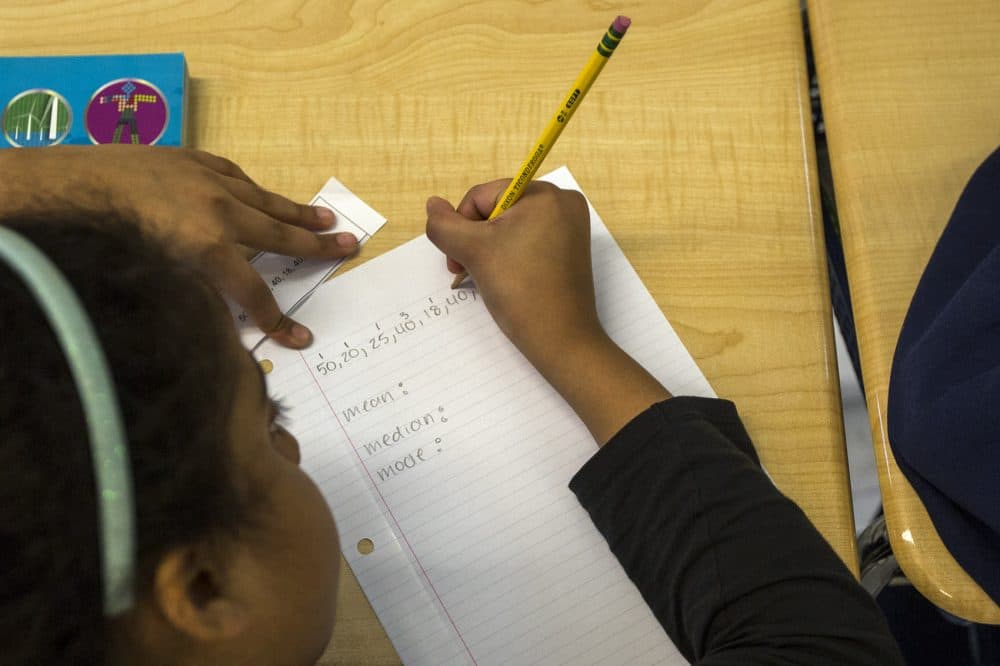Advertisement
Solving Our Math Problem
Changing Your Math 'Mindset' Can Boost Your Math Performance
Resume
There’s a scene in the 1988 movie "Stand and Deliver," where high school math teacher Jaime Escalante (played by Edward James Olmos) argues with the head of the school’s math program about the students' ability to do math.
"You can’t teach logarithms to illiterates," says math head Raquel Ortega, played by Virginia Paris. "Look, these kids come to us with barely a seventh grade education. There isn’t a teacher in this room that isn’t doing everything he possibly can."
Escalante pauses, then responds with: “Students respond to the level of expectations in here."
'Fixed' Vs. 'Growth' Mindset
Twenty-nine years after "Stand and Deliver," a growing number of teachers are excited by the idea that even the most challenging kids can do well at math. And this time, their efforts are backed by brain science.
"A lot of teachers have wanted to believe that students could achieve, but have been held back by ideas that have been around for so long, that some kids are smart and some kids aren’t,” says Stanford University math professor and author Jo Boaler. “And when they get the new brain science that shows anybody can be as smart as they want, that’s really liberating for them, I think.”
Boaler and fellow Stanford professor Carol Dweck have both done research that shows a student’s mindset around math is a major determining factor of whether or not they will excel in the subject.
“Kids with a growth mindset do better, persist longer, and are more successful,” Boaler says. “[But] they don’t get it through just telling them to have a growth mindset, you have to teach in those ways.”

After studying the behavior of thousands of children, Dweck coined the terms "fixed" and "growth" mindsets. Essentially, in a fixed mindset, students believe qualities, like intelligence or talent, are fixed traits. Students spend time documenting their intelligence or talent instead of developing them. They also tend to believe that talent alone creates success, without effort.
In a growth mindset, students believe their most basic abilities can be developed through dedication and hard work. Boaler believes this creates a love of learning and sets students up to learn from mistakes, instead of feeling crushed by them. But Boaler says a student's mindset can only go so far. Many of the traditional ways teachers teach math go against the brain’s ability to learn and retain math concepts.
Tonya Mosley and teacher Jonathan Norwood spoke on Facebook Live about how play can turn into mathematical learning:
“For instance, our working memory shuts down when we’re stressed,” Boaler says. “And timed math tests? Well, they stress kids out.”
It’s an idea that resonates with Jonathan Norwood, a first grade teacher at Lawrence Elementary in Brookline.
“There’s very little resources devoted to early mathematical thinking,” Norwood says. “And that runs counter to the research. It runs counter to what Fortune 500 companies want in their new employees, and we have to change that mindset.”
Norwood’s classroom looks more like a children’s science museum than a typical class, with lots of objects like puzzles and textiles to touch, count, add and subtract. Norwood finds that when it comes to cultivating a growth math mindset, the parents are often the toughest to convince.
“Their kids are watching them, very carefully,” Norwood says. “How often do you hear people say, ‘I’m not good at math'? How often do you hear people say, 'I’m not very good at reading’? Not so much. So that’s a simple yet significant example. So we have to change teachers' language, we have to change parents' language."
'My Goal Is To Build Their Confidence'

But for some teachers, this process of teaching also requires a shift in mindset.
Fifth grade Boston Collegiate Charter School teacher Bridget Adam says it takes hard work to cultivate a growth mindset because it involves changing the way teachers teach. "There are definitely days when I say to myself, 'Um, I don't know, I think I'm just going to go to where I'm comfortable.' "
To combat this tendency, Adam says she is deliberate about her approach. In front of her students, she acts as more of a facilitator or moderator than traditional teacher.
"I tell parents at the beginning of the school year that, like, my goal is not to have all 'A' students; my goal is to build their confidence," she says.
Adam believes not only do our brains grow when we make mistakes, but discussing math problems and failures out loud with one another can actually help students understand the material better.
"I think it’s always better for kids to learn from each other and then the kids who got to help is solidifying the understanding even more," she says.
Adam's class could easily spend an entire hour talking through one math problem. But one of the downfalls of this newer way of teaching is that there isn't always time for it. Educators are required to cover lots of topics each year.
“It's a hard balance with Common Core and these rigorous, rigorous standards," Adam says, "but then I don't want them to feel discouraged because things are so hard. I want them to think about the progress they're making. It's a hard balance.”

And then there is another, sometimes-even-more-challenging issue.
By the time students get to high school it gets even harder to change their mindsets. They often bring with them bad experiences from elementary and middle school.
“When I first started teaching Algebra 1, I got this weird perception from my students,” says Kaitlyn Aspell, a ninth grade math teacher at Canton High School. "They kept saying to me, ‘Oh I’m bad at math,' like, 'You should know I’m bad at math,' and it was shocking to me because it never occurred to me that I was bad at math."
Aspell believes this mindset is often because the students don’t do well on math tests. Which is why the first week of school, Aspell keeps things low key by playing this game called "inspirational math,” which she learned from Stanford's Boaler. The game involves playing around with numbers, making up their own math problems, and testing each other.
"We’re trying to break down the idea that there are good and bad ways to do math and change it to, everybody here is capable of doing math and the fact that we’re just playing with it, we’re all doing math well," Aspell says.
Aspell doesn't believe teaching a growth math mindset offers some sort of magical fix. But some of her students who've entered her class hating math actually leave telling her they enjoyed it. And that is the first step in dispelling the notion of the "bad math student."
This segment aired on April 11, 2017.
